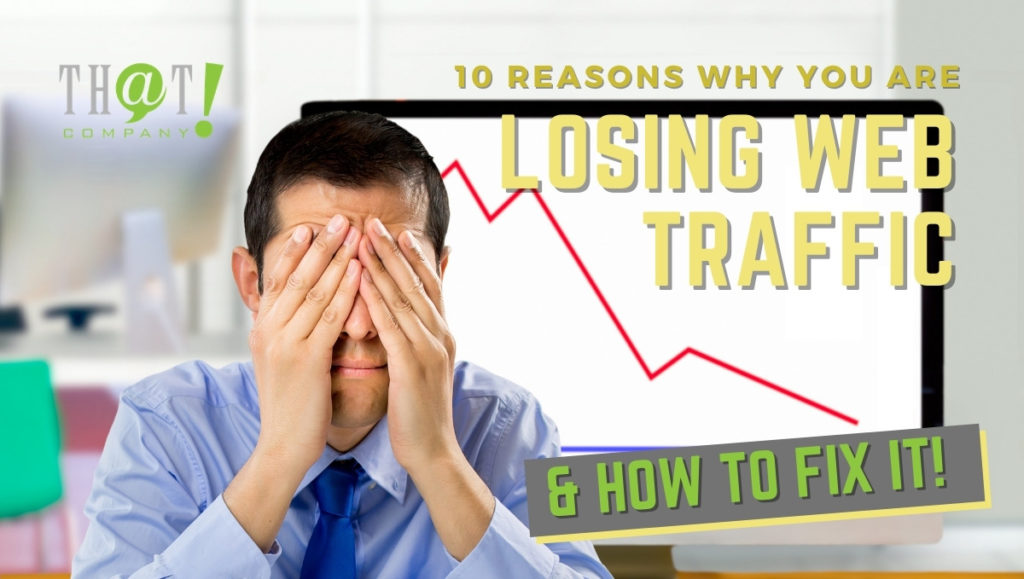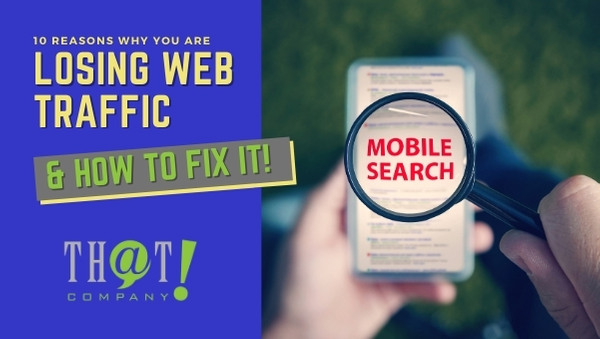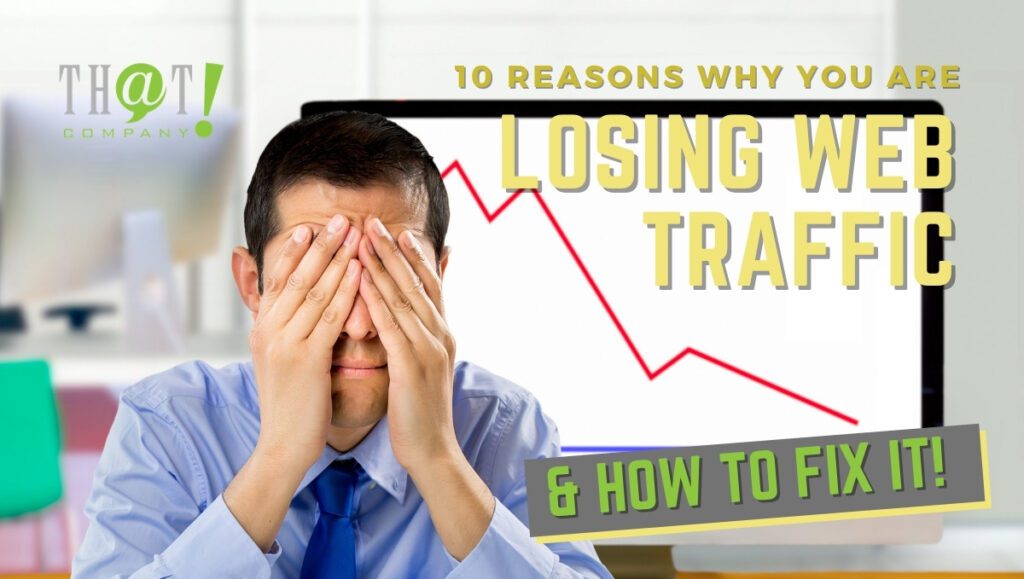 The web universe is changing, things are moving faster, algorithms are more complex and information is more targeted. More people use the web every day and yet you are losing web traffic. What is going on?
The web universe is changing, things are moving faster, algorithms are more complex and information is more targeted. More people use the web every day and yet you are losing web traffic. What is going on?
1) Did Wal-Mart move into your town?
Sometimes you have the entire playing field to yourself. You are the only hardware store in the forest and all is good until they build a shiny new big box store down the street and you are suddenly sitting in a vacant store. You could just hate the behemoth and cry about your losses or you could do what my neighborhood hardware store did. He began establishing relationships with local contractors and handymen. Then he built a network of relationships with local rental businesses and he became a broker of services and a provider of things that the big box didn’t sell or supply.
[bctt tweet=”Things are moving to the mobile market, so be mobile responsive or you will lose traffic to the guy who is.” username=”ThatCompanycom”]When a Zillow enters your market, you can not compete with their search engine, you simply don’t have the resources. What you can do is become the place to go for the local skinny: what neighborhoods offer special perks, what communities show the greatest potential growth, what realtors will work their fingers to the bones for the customer. Large search engines are great at providing giant lists, but people want guidance, they want a name and face, you can become that face.
2) How phone savvy is your site?
This was the first year that searches on phones beat searches on pages. How easy is your site to navigate on a 4-inch screen? Do you have massive images and cool graphics that take forever to download on sketchy cell phone data signals? Is your front page built so they have to scroll left and right as well as up and down to get any useful information? Is it mobile compatible?
 Things are moving to the mobile market, so be mobile responsive or you will lose traffic to the guy who is. This doesn’t mean you have to change your whole site, or maybe it does. If your site was built in the ’90s and has been growing in chunks since then, you may have to do a full work-over. However, if your site is a WordPress site, you may just need an upgrade or a plug-in. Either way, if you don’t change, you won’t have traffic for long.
Things are moving to the mobile market, so be mobile responsive or you will lose traffic to the guy who is. This doesn’t mean you have to change your whole site, or maybe it does. If your site was built in the ’90s and has been growing in chunks since then, you may have to do a full work-over. However, if your site is a WordPress site, you may just need an upgrade or a plug-in. Either way, if you don’t change, you won’t have traffic for long.
3) Is it that time of year?
Is your business seasonal? DO you prepare for the offseason, do you keep a mailing list for slow times? Hopefully, you know your business, so build a plan to get traffic when
no one is looking for your product. HVAC vendors often focus extra efforts on spring and fall to draw slow season business to the table. Special services and discounts, content on what to do before it’s time, and email blasts to customers to remind them you exist will increase the slow season traffic. Also, social media interaction can keep you higher in their minds. A Facebook page and some YouTube how-to videos could ignite the web traffic.
4) How old is your content?

Let’s face it, old stuff is not enticing. Not to you, not to Google, and not to your customers. Especially if they have read it before or seen it everywhere else. Look closely at your industry, what is missing, what are the customers asking now and what do you have to help them solve their problems. Write it up, put some images in the write-up, add a Facebook post, and maybe even an infographic!
5) Are you losing web traffic because your content is not relevant?

Just like old content, irrelevant content is not worth posting. Stories about the battle of Gettysburg on your Feed store site is incongruous. A personal blog and a link are fine, but 2000 words about non-relevant content are confusing to search engines. It gives the appearance of a lack of focus and leaves the customer wondering what your site is about.
6) How useful is your content?
People go on the web because they want to know something, buy something, or be entertained. If you sell something, you should talk about all the problems and solutions that the product is involved in. Talk about how to buy it, how to use it, how to shop for it. Listen to your customers and write answers to their concerns, questions, and problems. Be of use to them, be their authority on your product and do it in such a way that when people write a question in their search engine, your site answers that question. Sites that are useful and provide value are not typically the ones losing web traffic.
7) Did you miss the Google cut from 7 to 3?
 Local SEO used to be about the big 7, if you were reviewed enough and got enough link juice, you were one of the top 7. That has changed. There are now 3 and you have to be better than anyone else to be one of those top 3. More content, better content, reviews from all the citations sites, and answers when a client gives you a negative review. Being number one now equals giving more and offering something better. Writing on your site, looking at the competition’s site, and being better than them. If they write 1000 words on widgets, you need 1500 words about how to properly care for your widget. If they have 7 reviews, you need 9.
Local SEO used to be about the big 7, if you were reviewed enough and got enough link juice, you were one of the top 7. That has changed. There are now 3 and you have to be better than anyone else to be one of those top 3. More content, better content, reviews from all the citations sites, and answers when a client gives you a negative review. Being number one now equals giving more and offering something better. Writing on your site, looking at the competition’s site, and being better than them. If they write 1000 words on widgets, you need 1500 words about how to properly care for your widget. If they have 7 reviews, you need 9.
8) Are you losing web traffic because your competitors are doing it better?

It isn’t about how expensive, although that will affect your reviews, it isn’t about how well you do the job, which again will affect your reviews. It’s about what they have done on their site and about you being better. Being better for your customers is offering education with a little entertainment. Offering off-season specials with a “what to look for” article. Being a better marketer on the web entails you excelling past your competitors in a way that will keep them struggling to keep up. Are there new technologies and products in your industry? Are there better ways to manage your products and services that will save your customers money and time? Write about them, engage with your potential customers, and interact with your old customers, do it well, better than the competition and do it often.
9) Is your web environment old and outdated?
 So many changes have happened in the last few years, mobile environment, improved HTML, and faster internet speeds. Has your site kept up? An old site is prone to hacking and abuse, generally slower and less attractive and harder to maintain. It is important to stay in the top 20% of the leading edge. You don’t necessarily want to be on the “Bleeding Edge” of technology, but old, slow, and clunky will never serve you. If you want to see yourself rapidly crash and burn, just let some internet pirate piggyback their porn site on your business and have Google and your ISP blacklist your site. Losing web traffic will be the least of your worries because suddenly, you won’t exist and the phone will stop ringing.
So many changes have happened in the last few years, mobile environment, improved HTML, and faster internet speeds. Has your site kept up? An old site is prone to hacking and abuse, generally slower and less attractive and harder to maintain. It is important to stay in the top 20% of the leading edge. You don’t necessarily want to be on the “Bleeding Edge” of technology, but old, slow, and clunky will never serve you. If you want to see yourself rapidly crash and burn, just let some internet pirate piggyback their porn site on your business and have Google and your ISP blacklist your site. Losing web traffic will be the least of your worries because suddenly, you won’t exist and the phone will stop ringing.
10) When was the last time you played with your site?
Does your site reflect your company? Do the pictures and articles speak as you do? If not, why? It is fine to hire a savvy web developer and build a top-notch site, but if it isn’t conveying the message of your company, it is sending the wrong message and people will respond negatively to that. If you are the best coffee shop in town with cool roasters and a skateboard park out back, the hyper-conservative web image is wrong for you. By the same token, if you are the oldest bank in Boston, then the Hello Kitty Word Press theme is probably not right for your image.
So, it is about being BETTER. If you are consistently losing web traffic, spend time fixing your site. That is the new mantra of the search engines. Provide better information, provide better service with better support and better responses to problems. Have quality content, that addresses the customers’ needs and do it better than your competitors and be consistent about adding content and addressing changes in your industry.
Google is presently the leader in search engines, but even if they drop off the face of the Earth tomorrow, all search engines are following suit. They are intent on having authorities, providing high-quality content, and guidance to the consumer. If you set that as your intent, you will rise to the top and stay there, regardless of the search engine, regardless of the industry, and regardless of the competition.
So, in summary:
- Be what the consumer needs in your niche;
- Whatever the technology, keep up with what people are using;
- Adapt your site to the demands (today it’s mobile);
- Know your seasons and prepare for them;
- Keep your content fresh;
- Keep content focused on your industry;
- Be useful;
- Be the very best;
- Keep up with the pack technologically;
- Make the site reflect your corporate persona.
If you keep yourself close to these ideas, you will keep your site near the top. A lot of things matter and some of them will hold you back unexpectedly, but keeping these things under control will help you grow and become more visible. Losing web traffic may become a thing of the past. You may not always be number 1, but you will be consistently visible, and that matters in the long run. When all else fails, there are experts who can do this for you and they can often do it cheaper, more consistently and faster then you can. If it seems overwhelming, if you need all your time to run your business or if you just want someone else to do it, seek them out.






























